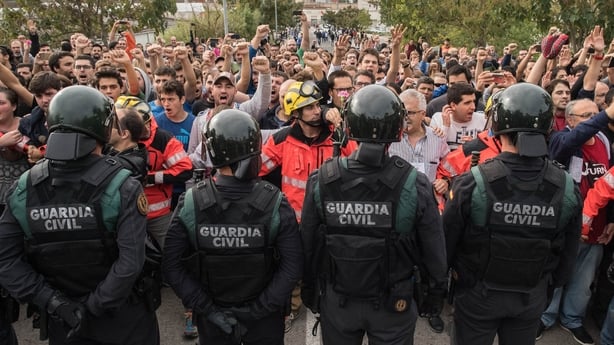Catalan secessionists were working today towards a unilateral declaration of independence from Spain that could be adopted next week in defiance of a court order and increased economic pressure from Madrid.
After Spain's Constitutional Court suspended a session of the Catalan regional parliament set for Monday, which had been expected to endorse an independence declaration, the parliament said the region's pro-independence leader Carles Puigdemont would address the assembly at 6pm on Tuesday.
Madrid apologised for the first time today for police use of violence in trying to hinder a weekend referendum it had declared illegal.
That crackdown raised the temperature of a confrontation that has grown into the worst political crisis for decades in Spain.
We need your consent to load this rte-player contentWe use rte-player to manage extra content that can set cookies on your device and collect data about your activity. Please review their details and accept them to load the content.Manage Preferences
A Catalan legislator was quoted by El Mundo newspaper as saying secessionist parties in the Catalan parliament were discussing an independence declaration to be submitted to the assembly next Tuesday.
"We are in talks about a text, with paper and pencil, on the declaration that we want the regional parliament to accept on Tuesday," Carles Riera, a lawmaker from the pro-independence CUP (Popular Unity Candidacy), was quoted as saying.
"Nobody has put forward any scenario of delay, ambiguity or confusion. We are not working on that scenario," he said.
The stakes are high for the eurozone's fourth-largest economy. Catalonia is the source of a huge chunk of its tax revenue and hosts multinationals from carmaker Volkswagen to drugs firm AstraZeneca.
Final referendum results released by the Catalan regional government today showed 90.18% support for breaking away among the nearly 2.3 million people who voted.
But turnout was only about 43% as Catalans who favour remaining part of Spain mainly boycotted the ballot.
The Catalan region's head of foreign affairs, Raul Romeva, told the BBC earlier that the Catalan parliament intended to make a decision on independence, without specifying when.
"Parliament will discuss, parliament will meet. It will be a debate and this is important," Mr Romeva said.

The Spanish government stepped up economic pressure on the Catalan government today by passing a law to make it easier for companies to move their operations around the country, potentially dealing a blow to the region's finances.
Within hours of the government's move, CaixaBank, Spain's third biggest lender and Catalonia's biggest company, said its board had decided to move its registered office to Valencia "in light of the current political and social situation in Catalonia".
Catalonia-based utility Gas Natural said its board had decided to move its registered office to Madrid for as long as the legal uncertainty in Catalonia continued.
They joined a number of other Catalonia-based companies, including Sabadell, Spain's fifth-largest lender, that have already announced plans this week to move their registered offices elsewhere in Spain.
Spain made a conciliatory gesture in apologising for last Sunday's referendum violence, where Spanish police used batons and rubber bullets to stop people voting.
The scenes brought worldwide condemnation and fanned separatist feeling but failed to prevent what the Catalan government described as an overwhelming 'yes' vote.
"When I see these images, and more so when I know people have been hit, pushed and even one person who was hospitalised, I can't help but regret it and apologise on behalf of the officers that intervened," Enric Millo, the Spanish government's representative in Catalonia, said in a television interview.
The apology came after the Catalan newspaper La Vanguardia quoted sources in Mr Puigdemont's party as saying a unilateral declaration of independence could be delayed if Madrid made a "gesture", such as withdrawing some Spanish police reinforcements from the region.
Artur Mas, a former head of the Catalan government who was barred from public office for two years in March for staging an informal independence referendum in 2014, told the Financial Times today that the region had yet to lay the groundwork for "real independence".
He said there was a debate among Catalan leaders about whether now was the right time to unilaterally declare independence.

